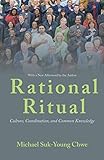Rational Ritual : Culture, Coordination, and Common Knowledge / Michael Suk-Young Chwe.
Material type: TextPublisher: Princeton, NJ : Princeton University Press, [2013]Copyright date: ©2013Edition: With a New afterword by the authorDescription: 1 online resource (152 p.) : 8 halftones. 23 line illus. 3 tablesContent type:
TextPublisher: Princeton, NJ : Princeton University Press, [2013]Copyright date: ©2013Edition: With a New afterword by the authorDescription: 1 online resource (152 p.) : 8 halftones. 23 line illus. 3 tablesContent type: - 9780691158280
- 9781400846436
- Cognition and culture
- Collective behavior
- Knowledge, Sociology of
- Rational choice theory
- Rites and ceremonies -- Social aspects
- SOCIAL SCIENCE / General
- advertising
- anthems
- ceremonies
- collective consciousness
- common knowledge
- communication
- coordination problems
- cultural practices
- culture
- game theory
- group identity
- individual emotions
- intersubjectivity
- irrationality
- physical togetherness
- psychological stimulation
- public ceremony
- public ritual
- publicity
- rationality
- ritual speech
- rituals
- television advertising
- television shows
- 306.42 23
- HM651 .C49 2017
- online - DeGruyter
- Issued also in print.
| Item type | Current library | Call number | URL | Status | Notes | Barcode | |
|---|---|---|---|---|---|---|---|
 eBook
eBook
|
Biblioteca "Angelicum" Pont. Univ. S.Tommaso d'Aquino Nuvola online | online - DeGruyter (Browse shelf(Opens below)) | Online access | Not for loan (Accesso limitato) | Accesso per gli utenti autorizzati / Access for authorized users | (dgr)9781400846436 |
Frontmatter -- Contents -- List of Figures and Tables -- Preface -- 1. Introduction -- 2. Applications -- 3. Elaborations -- 4. Conclusion -- Appendix. The Argument Expressed Diagrammatically -- References -- Afterword to the 2013 Edition -- Index
restricted access online access with authorization star
http://purl.org/coar/access_right/c_16ec
Why do Internet, financial service, and beer commercials dominate Super Bowl advertising? How do political ceremonies establish authority? Why does repetition characterize anthems and ritual speech? Why were circular forms favored for public festivals during the French Revolution? This book answers these questions using a single concept: common knowledge. Game theory shows that in order to coordinate its actions, a group of people must form "common knowledge." Each person wants to participate only if others also participate. Members must have knowledge of each other, knowledge of that knowledge, knowledge of the knowledge of that knowledge, and so on. Michael Chwe applies this insight, with striking erudition, to analyze a range of rituals across history and cultures. He shows that public ceremonies are powerful not simply because they transmit meaning from a central source to each audience member but because they let audience members know what other members know. For instance, people watching the Super Bowl know that many others are seeing precisely what they see and that those people know in turn that many others are also watching. This creates common knowledge, and advertisers selling products that depend on consensus are willing to pay large sums to gain access to it. Remarkably, a great variety of rituals and ceremonies, such as formal inaugurations, work in much the same way. By using a rational-choice argument to explain diverse cultural practices, Chwe argues for a close reciprocal relationship between the perspectives of rationality and culture. He illustrates how game theory can be applied to an unexpectedly broad spectrum of problems, while showing in an admirably clear way what game theory might hold for scholars in the social sciences and humanities who are not yet acquainted with it. In a new afterword, Chwe delves into new applications of common knowledge, both in the real world and in experiments, and considers how generating common knowledge has become easier in the digital age.
Issued also in print.
Mode of access: Internet via World Wide Web.
In English.
Description based on online resource; title from PDF title page (publisher's Web site, viewed 29. Jul 2021)


